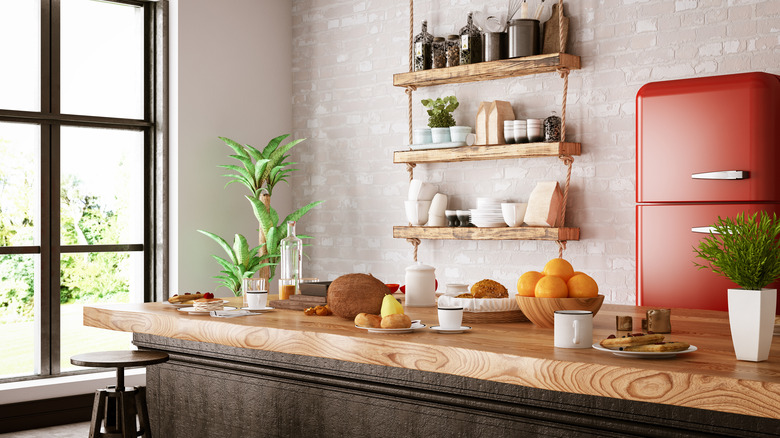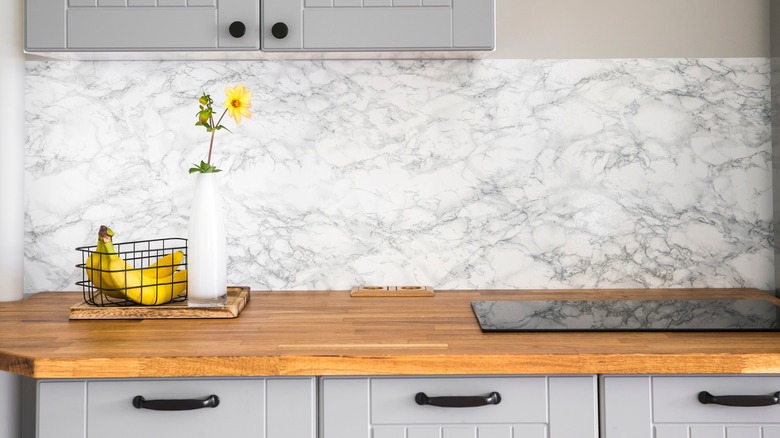Ben And Erin Napier's Kitchen Countertops May Not Be The Best Choice For Your Own Home
Ben and Erin Napier captured audiences' hearts with their charming look into small-town life. On HGTV's "Home Town," they remodel homes for clients, always infusing a bit of the rustic charm and quintessential character of the old homes they work on. Their signature style has inspired fans to incorporate some of the details in their own homes. The Napiers' kitchen features butcher block counters — Ben Napier even has a business that fabricates these wood counters, according to an Instagram post by Erin Napier. However, this material may not be the best choice for those who use their kitchen a lot.
Butcher block countertops, named for the similar surface used in butcher shops, use wood chosen specifically for the kitchen. Many homeowners also love the cozy cottage vibe these counters add compared to natural stone. However, while butcher block countertops look stunning in the kitchen, adding a unique texture and a warm, natural finish, they may not be the best choice for your home.
Though durable, butcherblock countertops require more maintenance than other materials. They can be prone to stains and scratches and aren't heat-resistant. The wood can also dry out if not properly cared for and must be resealed regularly to retain integrity. Those who lead busy lives and may not have time for upkeep may find owning butcher block counters too cumbersome.
Caution when cooking
If you are considering installing butcher block countertops in your kitchen, as Ben and Erin Napier have, bear in mind that you will need to take some precautions when cooking, as Erin is doing in this Instagram post. Wood is naturally absorbent, which can pose an issue in the kitchen. Spilling liquid on your butcher block countertops can lead to warping if the liquid is left to sit. Wood's natural absorption qualities also mean it can take on germs and mold spores that can settle into the counter, making it an unhygienic surface to cook on. Colored liquids such as drinks or sauce can also absorb into the wood and stain it if the mess isn't cleaned up right away. To prevent absorption, you need to use a sealer that is both water-resistant and food-safe, such as a mineral or tung oil. For the most protection, apply the oil multiple times, allowing it to dry completely between coats. You will have to reseal your countertops every month to keep the wood protected for the first year.
You must also be cautious with heat when you have butcher block countertops. Since wood is prone to burning, you must be careful with hot pots, pans, and baking sheets. This material cannot withstand high-texture exposure, so you should never place hot items from the stove or the oven directly onto wood countertops. Instead, you should use a metal trivet to keep the heat from coming into contact with the wood.
Sharp objects pose a threat
Erin and Ben Napier's butcher block counters add a beautiful rustic touch to their kitchen. Along with the enhanced aesthetics, one of the benefits of butcher block counters is being able to use them as a cutting board. Unfortunately, cutting your vegetables directly on the counter also leads to scratches on the surface of your counters. Sharp knives can slice up the counters, especially if it's a softer wood. Because of this, you may want to stick to hardwoods that are a little more durable, such as maple, walnut, and oak.
There are ways to keep butcher block counters in pristine condition even with previous damage. If you have used kitchen knives on your counter and they have left marks, you can get rid of them by sanding down the surface. Using a 60-grit sandpaper, you can buff out the individual knife scratches. However, you should not focus too hard on one spot as that can lead to a dip or divot in the counter. If the entire counter is covered in knife marks, scratches, or dents, you can use 100-grit and 150-grit sandpaper to go over the entire surface more evenly.

